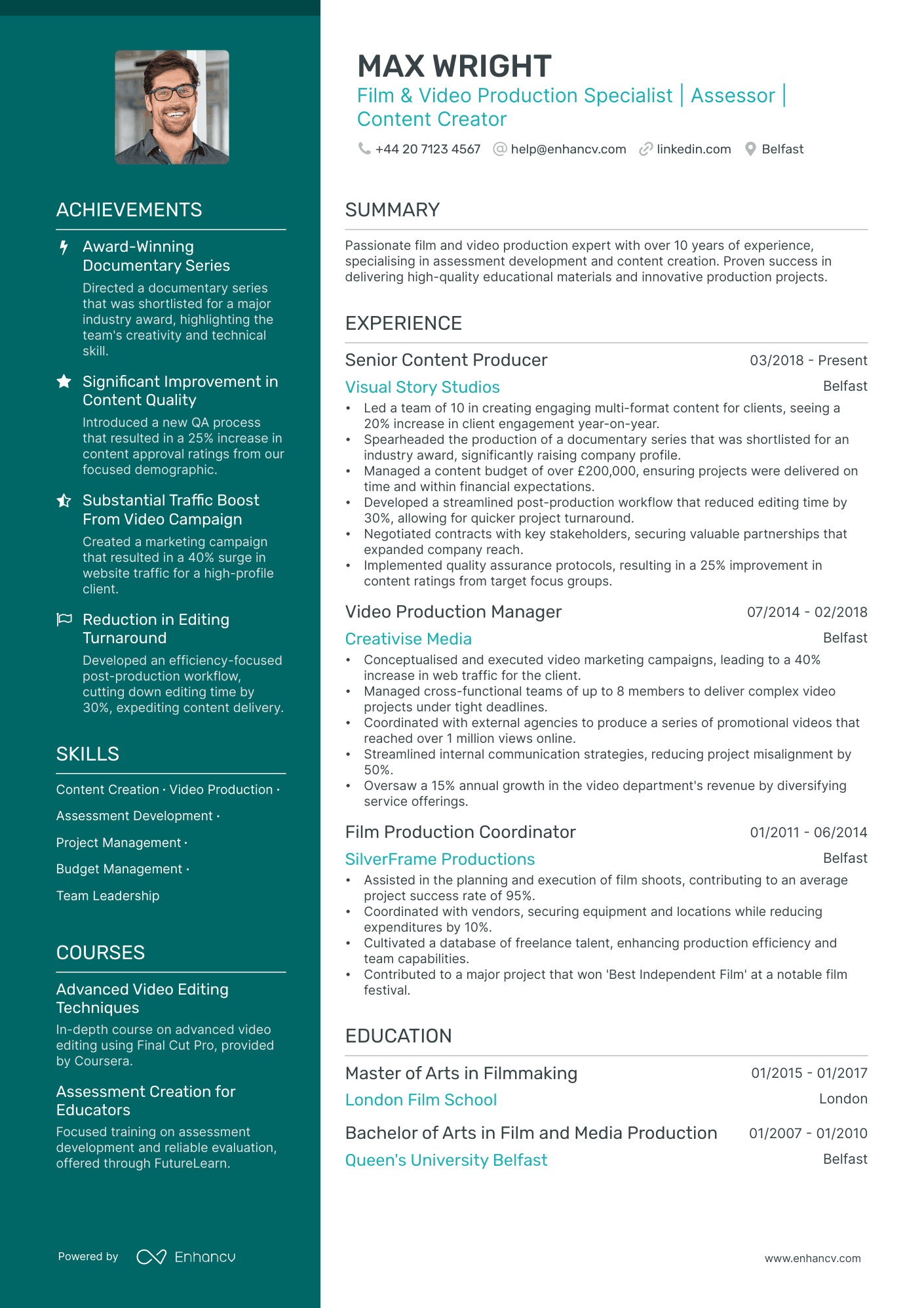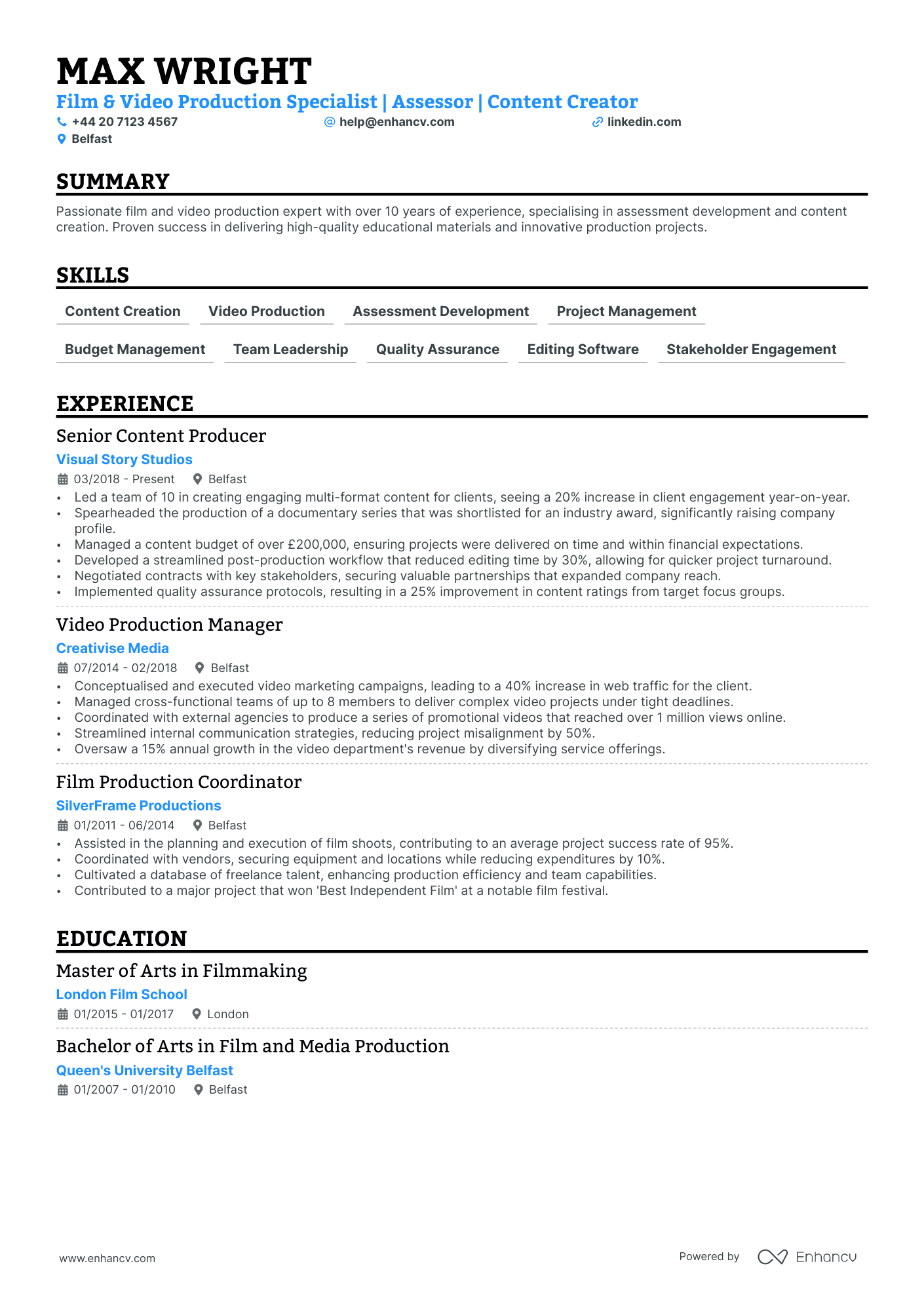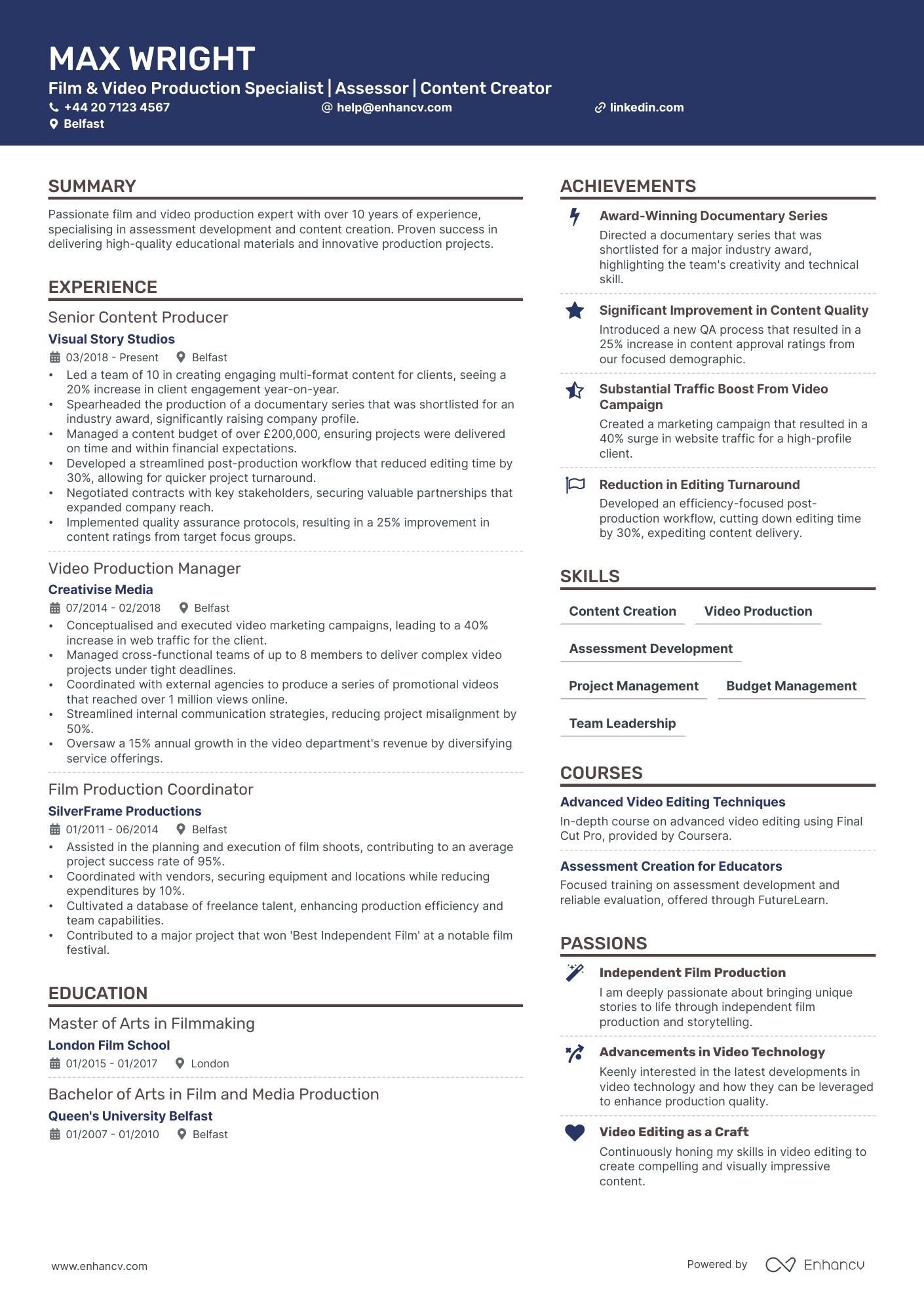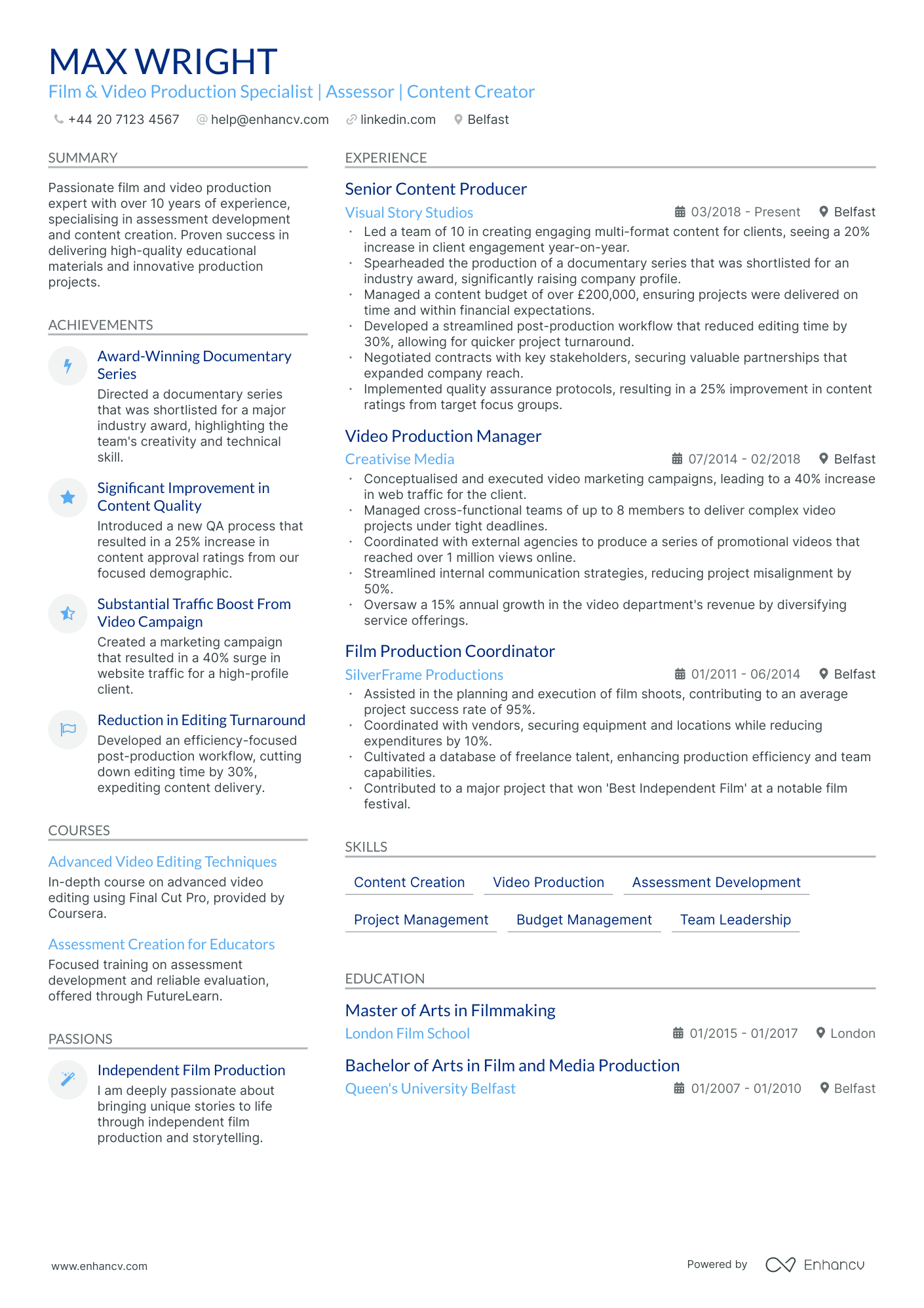One significant challenge in film is ensuring continuity and consistency across different scenes and takes, which requires meticulous attention to detail. Our guide provides comprehensive strategies and practical tips to help you manage this aspect of production, ensuring a seamless viewer experience.
- Answer job requirements with your film CV and experience;
- Curate your academic background and certificates, following industry-leading CV examples;
- Select from +10 niche skills to match the ideal candidate profile
- Write a more succinct experience section that consists of all the right details.
Do you need more specific insights into writing your film CV? Our guides focus on unique insights for each individual role:
Structuring your film CV layout: four factors to keep in mind
There are plenty of best practices out there for your CV layout and design. At the end of the day, a clear format and concise CV message should be your top priority. Use your CV design to enhance separate sections, bringing them to the forefront of recruiters' attention. At the same time, you can write content that:- Follows the reverse chronological order in the experience section by first listing your most recent jobs;
- Incorporates your contact information in the header, but do skip out on the CV photo for roles in the UK;
- Is spotlighted in the most important sections of your CV, e.g. the summary or objective, experience, education, etc. to show just how you meet the job requirements;
- Is no longer than two-pages. Often, the one-page format can be optimal for your film CV.
Before submitting your CV, you may wonder whether to export it in Doc or PDF. With the PDF format, your information and layout stay intact. This is quite useful when your CV is assessed by the Applicant Tracker System (or the ATS) . The ATS is a software that scans your profile for all relevant information and can easily understand latest study on the ATS , which looks at your CV columns, design, and so much more.
PRO TIP
Be mindful of white space; too much can make the CV look sparse, too little can make it look cluttered. Strive for a balance that makes the document easy on the eyes.
The top sections on a film CV
- Personal Details section includes name, contact information and any representation like an agent, which is essential for establishing initial contact and representation.
- Filmography or Relevant Projects showcases an individual's past work and is vital to demonstrate industry experience and competence.
- Education and Training highlights formal qualifications and industry-specific skills, underlining one’s foundational knowledge and dedication to craft.
- Skills and Proficiencies provide a snapshot of the candidate’s unique abilities and technical know-how, crucial in the film industry.
- References or Endorsements feature commendations from previous colleagues or employers, offering credibility and a measure of professional reputation.
What recruiters value on your CV:
- Highlight your relevant film experience by listing your most notable projects first and detailing your specific role and responsibilities on each set, ensuring to mention any successful outcomes or recognitions the projects received.
- Include a well-curated section of your technical skills that are pertinent to the film industry, such as proficiency in editing software, camera operation, or special effects, to demonstrate your hands-on expertise and versatility.
- For roles such as director or screenwriter, emphasise your storytelling abilities by mentioning any original scripts or story concepts you've developed or contributed to, showing your creativity and understanding of narrative structure.
- If you're applying for a role in production, detail your organisational skills, experience with budget management, and your ability to coordinate logistics, as these are crucial for ensuring smooth operation behind the scenes.
- Include testimonials or references from industry professionals you've worked with, such as actors, producers, or film crew members, to provide credible insights into your work ethic, collaborative spirit, and professional reputation in the field.
Recommended reads:
What information should you include in your film CV header?
The CV header is potentially the section that recruiters would refer to the most, as it should include your:
- Contact details - your professional (non-work) email address and phone number;
- Professional photograph - if you're applying hinting at the value you bring as a professional.
Many professionals often struggle with writing their film CV headline. That's why in the next section of this guide, we've curated examples of how you can optimise this space to pass any form of assessment.
Examples of good CV headlines for film:
Director of Photography | "Epic Landscapes: A Cinematic Journey" | HDR Imagery Expert | BSC | 10+ Yrs
Production Designer | Recreating Historic Paris: "The Enlightenment" | Period Pieces Specialist | BAFTA Nominee | 15 Yrs
Film Editor | "Rhythms of the City" Lead Editor | Montage Artistry | Avid Certified | 7 Yrs Exp
Costume Designer | "Victorian Secrets" Wardrobe Lead | Textile Historian | MFA | 20+ Years Industry Veteran
Sound Mixer | "Nature's Whisper" Documentary Audio Lead | Foley Artistry | Dolby Certified | 12 Yrs
Visual Effects Supervisor | "Alien Skies" VFX Innovation | CGI & Motion Capture | 8 Years Expertise
What's the difference between a film CV summary and objective
Why should it matter to you?
- Your film CV summary is a showcasing your career ambitions and your unique value. Use the objective to answer why your potential employers should hire you based on goals and ambitions. The objective is the ideal choice for candidates who happen to have less professional experience, but still meet some of the job requirements.
Before you select which one will be more relevant to your experience, have a look at some industry-leading CV summaries and objectives.
CV summaries for a film job:
- With over a decade of experience as a film editor, adept at Adobe Premiere Pro and After Effects, I have contributed to award-winning films, including a BAFTA-nominated documentary. I bring a meticulous eye for detail and a passion for storytelling to produce captivating cinematic experiences.
- As a former theatre director transitioning to film directing, I leverage 8 years of experience in stage storytelling and character development, coupled with a newfound proficiency in Final Cut Pro, to create powerful, visually driven narratives in a new medium.
- With 15 years as a lead cinematographer in the bustling Bollywood film industry, my portfolio includes over 30 feature films and an Indian Film Academy Award for Best Cinematography. Expertise in cutting-edge camera equipment and lighting techniques defines my robust filmography.
- A seasoned graphic designer with 5 years of experience now pursuing a career in film production design, I am eager to apply my strong background in visual arts and Adobe Creative Suite to crafting immersive environments that elevate storytelling on screen.
- Keen to enter the film industry, my aim is to apply my fresh perspective and dedication to learning on set. Eager to absorb every aspect of filmmaking, from pre-production through post, and to contribute creatively to projects that resonate with global audiences.
- As an aspirant screenwriter with a rich background in blogging and literature, I am passionate about crafting compelling narratives. I am driven to bring a fresh voice to the screen, aiming to master the nuances of scriptwriting through hands-on experience in a dynamic production environment.
The best formula for your film CV experience section
The CV experience section is the space where many candidates go wrong by merely listing their work history and duties. Don't do that. Instead, use the job description to better understand what matters most for the role and integrate these keywords across your CV. Thus, you should focus on:
- showcasing your accomplishments to hint that you're results-oriented;
- highlighting your skill set by integrating job keywords, technologies, and transferrable skills in your experience bullets;
- listing your roles in reverse chronological order, starting with the latest and most senior, to hint at how you have grown your career;
- featuring metrics, in the form of percentage, numbers, etc. to make your success more tangible.
When writing each experience bullet, start with a strong, actionable verb, then follow it up with a skill, accomplishment, or metric. Use these professional examples to perfect your CV experience section:
Best practices for your CV's work experience section
- Detail your key roles and responsibilities, emphasising your contributions to various film projects. Highlight any particular scenes, moments, or elements that you directly influenced or created.
- Include the names of films, studios, or production companies, and your exact job title for each project. Demonstrating the calibre of productions you've been involved with can provide context for your experience.
- Mention any notable directors, actors, or industry professionals you've worked with. Collaborating with respected individuals in the industry could reflect positively on your expertise and reputation.
- List any technical skills or equipment proficiencies relevant to your film role. Showcasing your hands-on abilities with industry-standard technology can be highly appealing to employers.
- Quantify your achievements where possible, such as the budget you managed or the size of team you led. Numbers help illustrate the scope and scale of your involvement in a film project.
- Discuss the variety of genres or types of film projects you have worked on, such as shorts, feature films, or documentaries. Diverse experience can exhibit your adaptability and breadth of knowledge.
- If you’ve received any awards or professional recognition, include these accomplishments. Awards cement your reputation as a high-calibre professional in the film industry.
- Provide brief descriptions of film projects, focusing on your specific contributions and the skill set you deployed. Explaining the context of your role helps highlight your suitability for future projects.
- Note any collaborations with international crews or work on location internationally. Experience with global or diverse teams can be valuable in the increasingly international film industry.
- Managed a team of 15 on the set of 'Urban Tales', ensuring efficient operation of the filming process and maintaining schedule compliance, leading to the project being completed two weeks ahead of schedule.
- Implemented a new digital asset management system which reduced retrieval time of film footage by 35% and significantly improved post-production workflow.
- Directed the film's most pivotal scene that received critical acclaim at the London Film Festival, increasing the film's market reach by appealing to international distributors.
- Developed and executed the filming schedule for vast location shoots across Europe, navigating logistical constraints and enabling the production team to keep within the allocated budget.
- Oversaw the technical aspects of filming, including camera work and lighting, ensuring high-quality production valued at over £2M.
- Fostered relationships with key industry talent, securing award-winning actors for lead roles, which amplified the production's visibility and reception.
- Edited over 300 hours of raw footage into a cohesive and compelling narrative for the documentary series 'Nature's Pulse', which garnered an audience of over 1.5 million viewers upon release.
- Collaborated constructively with a cross-disciplinary team comprising directors, sound engineers, and graphic designers to deliver the final edit two months before the deadline.
- Streamlined the post-production process by introducing advanced software techniques, reducing editing time by approximately 25% without compromising quality.
- Crafted an original screenplay 'Echoes in Silence' which was selected for production by a major studio, ultimately grossing over £4M in the UK box office.
- Advised and collaborated with the creative team to ensure the integrity of the script was maintained throughout the filming process, resulting in high praise for storytelling.
- Negotiated deal for script option with a top-tier studio, including stipulations for sequels and adaptations, showcasing strong business acumen and industry foresight.
- Led the cinematography team for the critically acclaimed film 'Lost Horizons', which earned a nomination for Best Cinematography at the BAFTA Awards.
- Designed and executed a revolutionary shooting technique using drones, which created captivating aerial shots that became a hallmark of the film.
- Conducted meticulous pre-production analysis regarding lighting and camera angles, which greatly reduced the need for reshoots and kept the film under budget by 10%.
- Pioneered an innovative film marketing campaign using social media influencers, which increased pre-launch ticket sales by 50% compared to the studio's previous release.
- Built and fostered strategic partnerships with international distributors, expanding the film's presence to over 40 countries worldwide.
- Spearheaded the rebranding of the company's film division, resulting in a 30% increase in brand recognition and attracting top-tier talent for future projects.
- Coordinated and managed post-production efforts for the award-winning independent film 'Hinterland', ensuring timely delivery for the Cannes Film Festival.
- Innovated a cost-effective post-production pipeline that trimmed the project's budget by 15%, while maintaining the artistic vision of the director.
- Articulated and negotiated post-production service agreements, skillfully obtaining better rates for the studio and fostering long-term partnerships.
- Overseeing the research and development of cutting-edge VR filmmaking technologies, propelling the studio to the forefront of immersive cinematic experiences.
- Managing a talented team of engineers and artists focused on VR content creation for an upcoming feature film, which is projected to revolutionise the industry's approach to immersive storytelling.
- Secured over £2 million in funding by presenting the project's potential to venture capitalists, highlighting the viability and future profitability of VR cinema.
Swapping your professional experience (when you have none) with skills and more
Never underestimate the importance of relevancе when it comes to your film CV. Even if you don't happen to have much or any standard (full-time contract) professional experience, this doesn't mean you shouldn't apply for the role. Instead of a bespoke CV experience section:
- Showcase more prominently any internships, part-time roles, and volunteer experience that are applicable to the role and have taught you job-crucial skills;
- Feature a strengths or achievements section with your transferrable skills or talents you've obtained thanks to your work or life experience;
- Write an objective statement that clearly outlines your values as a candidate and defines your career ambitions;
- List your education or certificates that match the job profile closer to the top of your CV.
Recommended reads:
PRO TIP
If applicable, briefly mention a situation where things didn’t go as planned and what you learned from it, demonstrating your ability to learn and adapt.
Describing your unique skill set using both hard skills and soft skills
Your film CV provides you with the perfect opportunity to spotlight your talents, and at the same time - to pass any form of assessment. Focusing on your skill set across different CV sections is the way to go, as this would provide you with an opportunity to quantify your achievements and successes. There's one common, very simple mistake, which candidates tend to make at this stage. Short on time, they tend to hurry and mess up the spelling of some of the key technologies, skills, and keywords. Copy and paste the particular skill directly from the job requirement to your CV to pass the Applicant Tracker System (ATS) assessment. Now, your CV skills are divided into:
- Technical or hard skills, describing your comfort level with technologies (software and hardware). List your aptitude by curating your certifications, on the work success in the experience section, and technical projects. Use the dedicated skills section to provide recruiters with up to twelve technologies, that match the job requirements, and you're capable of using.
- People or soft skills provide you with an excellent background to communicate, work within a team, solve problems. Don't just copy-paste that you're a "leader" or excel at "analysis". Instead, provide tangible metrics that define your success inusing the particular skill within the strengths, achievements, summary/ objective sections.
Top skills for your film CV:
Screenwriting
Directing
Cinematography
Editing
Sound Design
Production Design
Camera Operation
Lighting Techniques
Visual Effects (VFX)
Colour Grading
Creativity
Communication
Teamwork
Problem-Solving
Time Management
Adaptability
Attention to Detail
Leadership
Flexibility
Stress Management
PRO TIP
If there's a noticeable gap in your skillset for the role you're applying for, mention any steps you're taking to acquire these skills, such as online courses or self-study.
Your university degree and certificates: an integral part of your film CV
Let's take you back to your uni days and decide what information will be relevant for your film CV. Once more, when discussing your higher education, select only information that is pertinent to the job (e.g. degrees and projects in the same industry, etc.). Ultimately, you should:
- List only your higher education degrees, alongside start and graduation dates, and the university name;
- Include that you obtained a first degree for diplomas that are relevant to the role, and you believe will impress recruiters;
- Showcase relevant coursework, projects, or publications, if you happen to have less experience or will need to fill in gaps in your professional history.
PRO TIP
Order your skills based on the relevance to the role you're applying for, ensuring the most pertinent skills catch the employer's attention first.
Recommended reads:
Key takeaways
Your successful job application depends on how you well you have aligned your film CV to the job description and portrayed your best skills and traits. Make sure to:
- Select your CV format, so that it ensures your experience is easy to read and understand;
- Include your professional contact details and a link to your portfolio, so that recruiters can easily get in touch with you and preview your work;
- Write a CV summary if you happen to have more relevant professional experience. Meanwhile, use the objective to showcase your career dreams and ambitions;
- In your CV experience section bullets, back up your individual skills and responsibilities with tangible achievements;
- Have a healthy balance between hard and soft skills to answer the job requirements and hint at your unique professional value.




